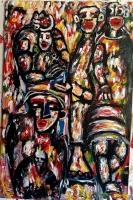Language
Articles tagged with Language
Tag Archive
- Afrolis
- alimentation
- Amazónia
- Andanças
- Ângela Ferreira
- angola
- Angolan
- angolan identity
- Batida
- beer
- Black movement
- black music
- body
- Britain
- Bruno Candé
- Camaroon
- Carnival
- Cham
- chronicle
- cinema indígena
- Comité Invisível
- Complô
- contemporary art
- contemporary city
- crioulização
- Dak'art 2016
- Dambudzo Marechera
- Danças africanas
- design
- développement
- Diálogos com Ruy Duarte de Carvalho
- Diário de um etnólogo guineense na Europa
- Dockanema
- Dombe Grande
- end of the world
- escritor
- exile
- Family Trip
- fleeing
- Geo-archaeological research
- geometry
- Guiné-Bissau
- Haiti
- hangar
- hospitality archaeologies
- humanist paradigm
- imperialism
- intellectuals
- intersectionality
- Ireland
- Jamaica
- João Pedro George
- language policies
- Leila Kilani
- liberation
- livros
- lovers rock
- Lusosphere
- Malcom X
- Maré
- Marielle
- media
- Memorial to Homage Enslaved People
- Middle East
- Modernity
- Monuments
- movements
- mudança
- museum
- neo-animists
- nicknames
- opinion
- pandemia
- peinture
- Periferia
- poetry
- polémica
- political protests
- post-memory
- Postmemory
- programation
- project
- próximo futuro
- radio
- Regina Guimarães
- Ruy Duarte de Carvalho
- São Tomé and Príncipe
- sexuality
- símbolos
- sorcery
- sound
- terrorisme
- The Sudanese Revolution
- Tribuna Negra
- utopia
- war
- William Kentridge
- Word
- Yonamine
- Yvone Kane
 Dear racialized friend, we both feel the weight, so let me end here as it’s getting late, when we talk about racism, whiteness and privilege, don't ever forget to create contexts, don't repeat the same claims as if they were refrains, don't talk about the system as if it operated and oppressed in the same way everywhere, with no aims or changes or such affairs, or as if the context of blacks in the USA was the same as that of blacks in Portugal, and of blacks in Brazil, and from there to blacks in Guinea.
Dear racialized friend, we both feel the weight, so let me end here as it’s getting late, when we talk about racism, whiteness and privilege, don't ever forget to create contexts, don't repeat the same claims as if they were refrains, don't talk about the system as if it operated and oppressed in the same way everywhere, with no aims or changes or such affairs, or as if the context of blacks in the USA was the same as that of blacks in Portugal, and of blacks in Brazil, and from there to blacks in Guinea.  What is a person? It's a threshold question, as if it could only be asked in the passage between an end and a beginning, at a moment when the list of the virtues of human existence is exhausted, dries up, and we finally see that what we thought was properly human is, after all, shared with other beings. In its tendency to move away from purist differentiations governed by exclusive properties, science not only fails to offer this guarantee, but has contributed to shattering the logic of unity, of restriction, of what is, in short, singular.
What is a person? It's a threshold question, as if it could only be asked in the passage between an end and a beginning, at a moment when the list of the virtues of human existence is exhausted, dries up, and we finally see that what we thought was properly human is, after all, shared with other beings. In its tendency to move away from purist differentiations governed by exclusive properties, science not only fails to offer this guarantee, but has contributed to shattering the logic of unity, of restriction, of what is, in short, singular.  Even more important are the studies by Lévy-Strauss; by members of the Latin American “decolonality” group such as Eduardo Viveiros de Castro, Walter Mignolo and Aníbal Quijanol; by anthropologists such as Aparecida Vilaça, Yvone de Freitas Leite, Elisa Loncon Antileo and Pedro Niemeyer Cesarino; and by indigenous leaders such as Ailton Krenac. The latter both denounce the extermination of native languages and also study them, trying to record them as far as is still possible. With this intellectual investment they recover the languages’ memory and, with it, a pre-colonial cultural universe.
Even more important are the studies by Lévy-Strauss; by members of the Latin American “decolonality” group such as Eduardo Viveiros de Castro, Walter Mignolo and Aníbal Quijanol; by anthropologists such as Aparecida Vilaça, Yvone de Freitas Leite, Elisa Loncon Antileo and Pedro Niemeyer Cesarino; and by indigenous leaders such as Ailton Krenac. The latter both denounce the extermination of native languages and also study them, trying to record them as far as is still possible. With this intellectual investment they recover the languages’ memory and, with it, a pre-colonial cultural universe.  If we accept that racism, sexism and other forms of oppression exist within language, then we must also recognize that it is through language – or languages – that oppression can be unmasked and combated. How? By allowing its structural, inclusive and persistent appeal to flow within the language towards creation and domesticated plurality. Linguistically created identities are not necessarily impenetrable frontiers or oppressive walls raised against the Other, but rather celebrations of every person’s multicolored singularity.
If we accept that racism, sexism and other forms of oppression exist within language, then we must also recognize that it is through language – or languages – that oppression can be unmasked and combated. How? By allowing its structural, inclusive and persistent appeal to flow within the language towards creation and domesticated plurality. Linguistically created identities are not necessarily impenetrable frontiers or oppressive walls raised against the Other, but rather celebrations of every person’s multicolored singularity. 